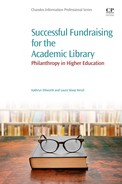Tools
Sponsored research
Abstract
Often thought of as the antithesis of development, sponsored research can and should be a strong tool for development officers. More than ever, philanthropy supports research, and the lines between fundraising and sponsored research are becoming blurred. There is confusion among faculty, who often misunderstand development and consider sponsored research their only option for funding. By building a strong relationship with sponsored research, an open communication can be developed that offers the best outcome for funding needs and solicitation attempts.
Keywords
Research; Philanthropy; Government funding; Faculty; Collaboration; Libraries; Giving; Sponsored research; Proposal
Sponsored research offices may have different names at different universities, but for this book, we will refer to such an office as sponsored program services (SPS). While working with faculty and development colleagues across campus is important, it’s also very important to cultivate relationships with the staff in SPS. Building a strong relationship with SPS has the potential to help all involved. A couple of directions assist in initiating partnership discussions. The first is through faculty you are already working with on private funding opportunities. Ask faculty to share proposals they’ve been working on with SPS. Your request may be met with hesitation at first, because faculty are often new to the development side of funding. Sometimes, the academic areas on campus, having not previously worked with university development, consider fundraisers to be similar to hard-nosed salespeople. So the first response may be concern or even suspicion. Faculty are often unaware that development officers raise money to support research. When they do find out, they will typically still defer to SPS because they have a comfort with that approach to funding (and it is the office where most funding for research comes from at a university). So tread the path of early discussion regarding private funding for research carefully and with open and clear communication. The first goal to achieve in the development of the relationship is to be included in funding discussions between faculty and SPS.
If a well-established collaboration between university development and SPS doesn’t already exist on your campus, the sponsored research staff may not understand at first why it is necessary, relevant, or even viable. Like a lot of other people on the academic side, if they aren’t familiar with working with fundraisers, there is a good chance that they fall into the camp that believes fundraisers simply ask rich people for money. So be prepared for hesitation or maybe even pushback.
Despite the fact that corporate-sponsored research is going on all over campus, when discussions about private support for research occur, it is common to encounter concern. It is based on a fear that individuals will dictate research or influence research outcomes. So by approaching the opportunity from the angle that you want to learn about the project in case there are ways to supplement private dollars for a project, you may avoid being immediately shut out.
The truth is that SPS commonly assists faculty in seeking private funding through foundations. Because foundations often won’t allow the administrative fees that a government grant does, sometimes SPS is happy to pass faculty onto a development officer for a foundation proposal. In either case, sharing the role of fundraising for research allows both SPS and university development to record funding. It also allows you both to partner in helping the faculty get funding. Developing a collaborative relationship with staff in SPS is beneficial to all involved: the faculty, staff in SPS, you and your work, and even the university.
The simplest way to explain to faculty and staff in sponsored research that partnering with staff in development is valuable takes two forms:
13.1 Provide connection to potential private funders and assistance to faculty for their research
This is a great way to begin as you are essentially telling researchers that you want to know what they are working on so that you can align private giving to support their projects. It mitigates any concerns that you are there to disrupt process, and it addresses misconceptions faculty and sponsored program staff may have about ethics as it relates to private giving for research.
13.2 Repurpose failed SPS grants for private or corporate foundation proposals
Not everything gets funded. One way to begin working with faculty is to talk to them about SPS proposals that were not successful. These projects are good for submission to foundations and individuals because they are ready to go (somewhat). They have a team defined, a desired outcome, and the budgets are already determined. One thing to be aware of as you look at these proposals is that the amount needed in private dollars will be significantly lower. The reason is that most private and corporate foundations don’t allow for overhead. If overhead is allowed, it is often only at a specified percentage of the overall budget. At a rate of a 50% mark-up for overhead in SPS, the failed proposal can often be funded by about half the original budget from an individual or foundation.
